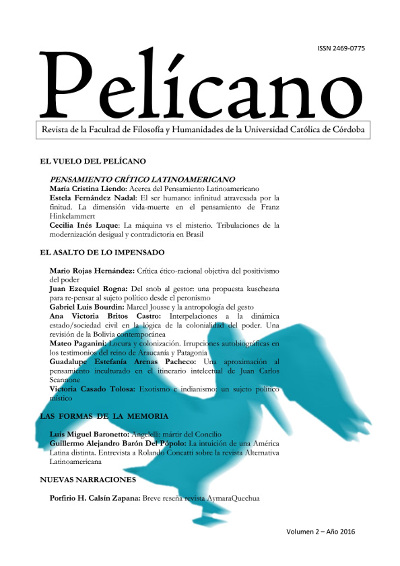Crítica ético-racional objetiva del positivismo del poder
Palabras clave:
Positivismo poder, crítica, autocontradicción performativa, príncipios éticosResumen
ResumenEste trabajo expone en primer lugar la tesis del positivismo del poder y algunas preocupaciones y preguntas que motivan el análisis y crítica filosóficos de esta tesis. En segundo lugar, se exponen concepciones que representan complementos inmanentes del positivismo del poder. En tercer lugar, se extraen algunas de las consecuencias prácticas desastrosas y éticamente reprochables de la tesis en cuestión. Por último se aportan argumentos trascendentales para defender, por un lado, que la posición sometida a crítica se enreda en una autocontradicción performativa, por lo cual se refuta a sí misma en cuanto autocontradictoria, y es por lo tanto falsa. Esto demuestra a la vez que sí existen normas, criterios y principios estrictamente éticos que son base constitutiva de determinadas acciones morales o éticas, y por rende, que sí hay acciones fundamentales que no se reducen al positivismo del poder ni consisten en el ejercicio de la política del poder, y a la vez, que hay principios normativos con base en los cuales se puede ejercer la crítica ético-racional legítima de éstos. Se exponen, por otro lado, sólo algunos de esos principios éticos fundamentales ya siempre presupuestos por quien argumenta seriamente para defender la tesis aquí puesta en cuestión.Palabras clave: Positivismo del poder, crítica, autocontradicción performativa, principios éticos.AbstractThis paper describes in first place the thesis of positivism of power along with some concerns and questions that give rise to the critique and philosophical analysis of this thesis. In second place, special conceptions that represent immanent complements of the so-called thesis of the positivism of power will be exposed. In third place, some of the disastrous and ethically blameworthy practical consequences of this thesis will be extracted. Finally, transcendental arguments will be provided to defend, on the one hand, that this position, when it is subject to hard-nosed criticism, becomes entangled in a performative self-contradiction, and therefore it becomes self-refuted as long as it contradicts herself, thus showing that it is false. This proves that they do exist strictly ethical norms, criteria and principles that are the constitutive basis of certain moral or ethical actions, and therefore, that there are indeed fundamental actions that are not reduced to the positivism of power nor the mere exercise of the politics of power, and this leads to prove that there are normative principles which allow to make a rational-ethical criticism of this type of ilegitimate display of power. On the other hand, there will be exposed only some of these fundamental ethical principles that are necessarily presupposed for whom seriously argues to defend the so-called thesis.Keywords: Positivism of power, Critic, Performative Self-Contradiction, Ethical Principles.Publicado
2016-08-26
Número
Sección
El asalto de lo impensado
Cómo citar
Crítica ético-racional objetiva del positivismo del poder. (2016). Pelícano, 2, 40-59. https://revistas.bibdigital.uccor.edu.ar/index.php/pelicano/article/view/1283



